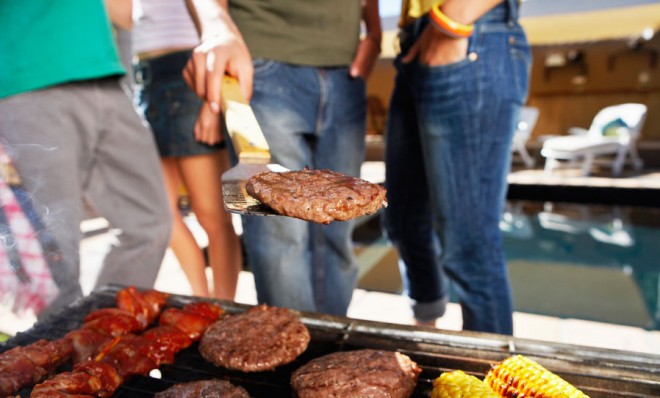Happy Memorial Day: Your BBQ grill may have more germs than a toilet seat
Let summer grilling season begin!


A free daily email with the biggest news stories of the day – and the best features from TheWeek.com
You are now subscribed
Your newsletter sign-up was successful
It's Memorial Day weekend, and people across the country are firing up their barbecues, officially launching the summer grilling season. Before you light the charcoal, though, you might want to consider this new discovery by British researchers: The average barbecue grill in the U.K. has more than twice as many germs as the typical toilet seat.
Full disclosure: The study, conducted by hygiene expert Lisa Ackerley, was commissioned by Jeyes, a company that makes cleaning products. Still, Ackerley is one of the leading experts on food safety in the U.K., and she warns that a grill's microbes can be transferred to burgers and hot dogs, and cause gastrointestinal infections.
How can outdoor grills be so filthy? Gardens, Ackerley says, are magnets for harmful bacteria — such as e-coli, salmonella, and listeria — because they're full of everything from decaying plant matter to spilled food to bird droppings. Even people who are sticklers for housecleaning can be a tad slovenly outdoors.
The Week
Escape your echo chamber. Get the facts behind the news, plus analysis from multiple perspectives.

Sign up for The Week's Free Newsletters
From our morning news briefing to a weekly Good News Newsletter, get the best of The Week delivered directly to your inbox.
From our morning news briefing to a weekly Good News Newsletter, get the best of The Week delivered directly to your inbox.
Seventy-one percent of the survey's 1,400 respondents said they wiped down their kitchen tables every day, and 42 percent cleaned their toilets just as often. Only 28 percent, however, said they cleaned their patio tables more than twice a year, and 36 percent said that was about as often as they washed their barbecue grills.
The good news, says Laurie Messing at Michigan State University Extension, is that there are four easy steps to make summer feasts safer. First, clean all cooking and prep surfaces, and wash your hands in warm soapy water (or use hand sanitizer) before you handle food. Next, make sure you separate raw meats from fruits and vegetables to prevent cross-contamination. Also, be sure to put cooked meat on a fresh plate — not the one it was on while raw. Finally, use a food thermometer to make sure everything is cooked enough to kill bacteria — 160 degrees Fahrenheit for burgers, 145 degrees for steaks, 165 degrees for chicken, etc.
Bottom line: Be careful inside and out. "If you'll be grilling at home, remember to always marinate meat in the refrigerator, never on the kitchen counter or outdoors," says the Institute of Food Technologies. And be sure to discard any extra marinade that has been in contact with raw meat. If you're grilling in a park or tailgating, try not to open your cooler more than absolutely necessary, since food must be stored at 40 degrees or cooler to reduce the risk of harmful bacteria.
A free daily email with the biggest news stories of the day – and the best features from TheWeek.com
Harold Maass is a contributing editor at The Week. He has been writing for The Week since the 2001 debut of the U.S. print edition and served as editor of TheWeek.com when it launched in 2008. Harold started his career as a newspaper reporter in South Florida and Haiti. He has previously worked for a variety of news outlets, including The Miami Herald, ABC News and Fox News, and for several years wrote a daily roundup of financial news for The Week and Yahoo Finance.
-
 6 of the world’s most accessible destinations
6 of the world’s most accessible destinationsThe Week Recommends Experience all of Berlin, Singapore and Sydney
-
 How the FCC’s ‘equal time’ rule works
How the FCC’s ‘equal time’ rule worksIn the Spotlight The law is at the heart of the Colbert-CBS conflict
-
 What is the endgame in the DHS shutdown?
What is the endgame in the DHS shutdown?Today’s Big Question Democrats want to rein in ICE’s immigration crackdown
